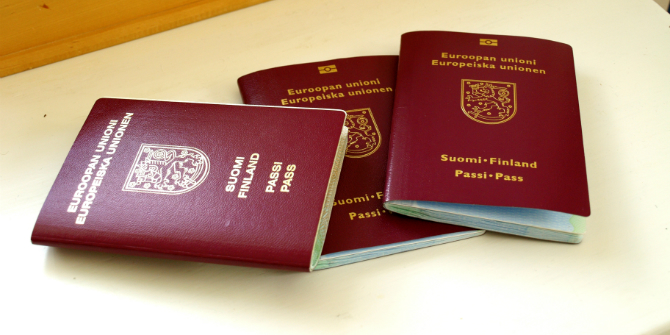Debates about the future of UK-EU relations have paid little attention to the European Parliament. There have been no studies comparable to those that have looked into how member states view the renegotiation or might respond to a Brexit. Media reports indicate that the European Commission taskforce handling the UK renegotiation has even looked into ways of avoiding the Parliament becoming involved. Questions persist, however, as to whether the Parliament can be ignored. If Britain votes to leave then the EU Treaty’s withdrawal clause guarantees the Parliament a say in the final deal.
To find out the views of the European Parliament BrexitVote is running a series – compiled by Tim Oliver – in which MEPs from across the Parliament set out what they think of the UK-EU renegotiation, the idea of Brexit and – most importantly – what role they think the Parliament will play. In this, the second part of the series, we hear from MEPs in the European People’s Party (EPP).
 European Parliament Strasbourg
European Parliament Strasbourg
Mairead McGuinness MEP (Ireland), EPP. Vice-President of the European Parliament
The UK referendum is a big talking point as we edge towards a possible “deal” in February. All member states are engaged in the debate, none more so than Ireland as we share a land border with the UK and our trade links are critically important. So too is the Peace Process in Northern Ireland which needs ongoing EU engagement. The pro-European parties in the European Parliament will not countenance any change that would restrict the fundamental principle of free movement of EU citizens, while wanting to assist in finding a solution to UK concerns about social support payments.
The negotiations are currently taking place at Council level with Parliament carefully watching in the wings. Speculation is rife about what sort of deal the UK might achieve; equally there is intense speculation about how a deal will be received by British citizens and how the actual referendum debate will go. The choice is for the citizens of the UK to make, but of course those of the 27 other member states have more than a passing interest in what emerges. The European Parliament is where the debate is centred and I look forward to Prime Minister David Cameron coming to Parliament to debate the issues with us. Right now there is an air of unreality about the process – when the real debate begins there will have to be some “hard talk” about what Brexit would mean for the people of the UK. At this point, the Brexiteers see no down side to an exit – the reality is somewhat different.
David McAllistair MEP (Germany), EPP. Chair of the Delegation to the USA
At this stage, the role of the European Parliament in the negotiations on Prime Minister Cameron’s proposals, is rather limited. The Parliament is involved on staff level in the negotiations. The Secretary General of the European Parliament and the Head of Cabinet of the President act as the “sherpas” of the Parliament in the Council. They report back to the Conference of Presidents, which consists of the President of Parliament and the chairmen of the seven political groups. The Conference of Presidents has invited the British Prime Minister to the Plenary to discuss his demands. This might be helpful to insure the outcome of the negotiations gets broad support and uncertainties can be explained and hopefully be eliminated.
At the moment, the most likely scenario is that there will not be any treaty change. What may happen is that a protocol or a declaration is made and signed as an international agreement, which commits Member States to certain actions. This is a purely intergovernmental process at this stage. The implementation of this agreement will probably take two forms – at some stage the ideas will have to be integrated into the Treaty. If an intergovernmental conference is called to change the Treaty, the Parliament will be directly involved, as it was the case in the past.
Prof. Danuta Hübner MEP (Poland), EPP. Chair of the Committee on Constitutional Affairs
The British referendum is not a one-off event. Whatever its future outcome, its prospect has in any case been shaping for a while the relationship between the UK and the EU, as well as impacting the potential role of the UK on the global level. Already at this stage, it is worrying that the UK, the citizens of which are also EU citizens enjoying all the rights given by the Treaty and having all the responsibilities resulting from the it, shows limited interest in the big issues we face together. This is unfortunate, especially when today’s Europe requires an unprecedented level of unity and solidarity. What is also worrying is a dramatic failure to appreciate the contribution of EU integration to the well-being and security of British citizens. There is a wealth of evidence of this contribution, but this is also what common sense tells us.
Leaving the EU would mean replacing what is known, has been shaped together and has been endorsed by the British Government, as well as by the Queen, by something unknown, unpredictable, and which will be shaped and governed by those outside the UK. British citizens have been misled for decades by political elites who offered them a vision of European integration in which British leaders had to continuously defend British interests. They have chosen to build their position in the Union through vetoing, opposing decisions, opting out, and blocking. The message sent to British citizens has been that British identity had to be constructed in opposition to Europe.
What is wrong about having or building together an ever closer union between us, European people who have built a community on the ashes of the Second World War? Will rifts and divisions and the absence of a common table to sit around and discuss make us better off and safer? Cannot we see that treaties providing common rules also provide protection against their abuse and allow us to appeal to the court in Luxembourg? We, the twenty seven member states, the European Commission and the European Parliament, will spare no effort to design jointly with the UK a package of responses to the British requests. But this package will be a well-balanced compromise, negotiated on the basis of rules and providing for a win-win feeling for all parties involved. Twenty-seven member states will also need, with regard to the future, an assurance of predictability for the governance of their countries and of the Union.
It has been made clear that what the UK wants is a reformed Union. The deal secured must therefore not undermine the capacity of the Union to deal with the challenges ahead. There are various scenarios for future UK – EU relations. Nevertheless, the referendum is only about staying or leaving. In this context, it seems disproportionate to accept that access to welfare benefits of non-British EU citizens working in UK can be a meaningful determinant of the decision to remain or leave. These foreign workers generate wealth, growth and innovation and contribute to UK’s public budget. They are especially needed in the current context, when the unemployment rate in UK is going down to 5.2% and a potential demand for new skills is growing.
But, of course, it is for British citizens to consider the pros and cons of their choice and to decide. If the “leave” sentiment wins, the exit will not be a total exit. UK will negotiate, as a third country, its new relationship with the powerful block of twenty-seven European states. The benefits of membership, in the fields of the single market, trade, research programmes, international policy and security, today so skilfully ignored by the anti EU camp, will be gone. Any firm interested in economic relations with the EU will have to respect European norms and standards, which will continue to evolve without the British position having any impact on them.
The referendum is a politically extremely powerful instrument of decision-making. When deciding to make use of it, politicians make citizens responsible for a decision of paramount relevance for future generations. An exit from the EU will not be just for a while. The EU is not a bus, one cannot hop off and hop in depending on one’s short term mood or needs. Sentiments can change over time, and the “leave” campaign is driven by merely by sentiments. We must go beyond them.
This blog represents the views of the authors and not those of the BrexitVote blog, nor the LSE.







Of course ALLTHEMEP want to stay in the EUROPEAN UNION they have a monetery interest. All they are concerned about is their fat salary and inflated expenses. They have no concern for anyone else no matter what they pretend. All they want without exception is to line their own pockets.